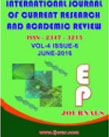Abstract Volume:4 Issue-6 Year-2016 Original Research Articles
 |
Online ISSN : 2347 - 3215 Issues : 12 per year Publisher : Excellent Publishers Email : editorijcret@gmail.com |
Mid day meal programme was introduced in India to protect child from class room hunger, increasing enrolment and attendance in the schools. It includes provision of lunch free of cost to school-children on all working days. Zinc deficiency is widespread and affects the health and well-being of populations worldwide. (i) To assess the nutritional contribution of mid day meal to the dietary zinc intake in school children (ii) to compare the prevalence of zinc deficiency between the children consuming MDM and NMDM school children. A total of 100 study subjects were randomly selected from two schools. Zinc and nutritional assessment was done using anthropometric measurements and 24 hours diet recall. Majority of study subjects (54%) in mid day meal school and also majority (54%) in non mid day meal school belonged to 11-12 years age group. Among 8-9 and 9-10 years of age 100% subjects were having low BMI˂18.5. The mean intakes of all macronutrients and micronutrients were found to be lower than the RDA. A significant difference (p˂0.05) were found in zinc intake between mid day meal and non mid day meal subjects belonging to 10-12 years age group. The nutritional contribution of mid day meal to dietary zinc was lower than the RDA (8-9mg).
How to cite this article:
Iram Khan and Sangeeta Pandey. 2016. Impact of Mid Day Meal on Nutritional Status of School Going Children with Special Emphasis on Zinc.Int.J.Curr.Res.Aca.Rev. 4(6): 61-67doi: http://dx.doi.org/10.20546/ijcrar.2016.406.007



Quick Navigation
- Print Article
- Full Text PDF
- How to Cite this Article
- on Google
- on Google Scholor
- Citation Alert By Google Scholar
